
Guest Blogged by Ernest A. Canning
"Yesterday, December 7, 1941 --- a date which will live in infamy."
- President Franklin D. Roosevelt
Amidst exploding bombs, smoke billowing from sinking battleships and dead bodies floating atop the oil slicked waters of Pearl Harbor, it was not all that difficult to appreciate the damage wrought by a surprise attack launched by the Empire of Japan. The same was true when we watched in horror as the smoldering twin towers of the World Trade Center precipitously collapsed on September 11, 2001.
Like these two earlier pivotal events, January 21, 2010 is, "a date which will live in infamy." Yet, unlike Pearl Harbor and 9/11, most Americans do not recognize it as such. This attack came not by way of planes or bombs delivered by some foreign menace. It came from within courtesy of what Professor Cass Sunstein aptly described as "radicals in robes" --- four directly connected to the Robert-Bork founded, billionaire-funded Federalist Society; all five as appointees of the Reagan and two Bush administrations. Men bent on unraveling the very constitution they had all solemnly sworn to uphold.
Their assault, though subtle, wrought far greater devastation than either Pearl Harbor or 9/11. They did not merely attack planes, ships and buildings. They assaulted the very foundations of our constitutional democracy...
As obnoxious as Dred Scott
Within the confines of American jurisprudence, there has not been a decision of equal infamy to Citizens United vs. Federal Election Commission [PDF] since 1857 when the Court decided Dred Scott vs. Sanford (aka The Dred Scott decision).
In Scott, the Court, in service of wealthy Southern landowner/masters, ruled that African-American slaves and their descendants could never be considered "citizens." They were but chattel, the personal property of their owners. The Southern slave master thus had a right to demand the return of his "property" should his property make the very human decision to escape.
It took a bloody civil war and the 13th Amendment to undue the damage the Court wrought by Dred Scott.
Just as the Court in Dred Scott became the legal instrument for a brutal 19th Century inequity by ruling that living, breathing human beings could never be citizens, so the five member Republican majority of the Court in Citizens United has become the legal instrument for a new 21st Century inequity by extending to artificial, inter-generational constructs known as "corporations" the rights that the framers of the Constitution had intended only to apply to living, breathing people who make up the actual citizenry of this nation.
It is a ruling that calls into question the validity of all laws which seek to prohibit or even limit the ability of corporate bought-and-paid-for candidates to flood the airwaves with the corporate message, either directly or through corporate-purchased propaganda time slots; an ability that can drown out the right of citizens to see and hear those who do not tow the corporate line. Citizens United has opened the door to the creation of a new master-class under the aegis of the most undemocratic of institutions --- the private corporation.
As observed by Jim Hightower in Thieves in High Places:
In Failed States Noam Chomsky observed that the political counterpart to a corporation is a totalitarian state.
Under Citizens United a separate right of unlimited "free speech" is extended to the billionaires at the pinnacle of these private totalitarian entities, even if those controlling the corporations could not themselves be extended the same rights as U.S. "citizens" because they are foreigners --- perhaps even foreign governments with controlling ownership interests in the newly erected "corporate citizens."
A democratically governed, knowledgeable electorate
The First Amendment does not merely protect the right to speak freely. It reads, in pertinent part: "Congress shall make no law…abridging the freedom of speech, or of the press…"
The distinction the framers made between "freedom of speech" and freedom "of the press" flows from the vital democracy-sustaining function played by knowledge. In short, the First Amendment was intended to insure that the U.S. would be democratically governed by a knowledgeable electorate.
James Madison astutely observed:
This vital democracy-sustaining function of a free press was explained by the 20th Century Supreme Court's most strident First Amendment champion, Justice Hugo Black, in his concurring opinion in New York Times vs. United States (the "Pentagon Papers" case):
Note that Justice Black referenced press "responsibilities" even as he referred to it as "free and unrestrained." The framers did not envision a press that was free to join in with government (or with private corporations) in order to deceive the people. Just as the framers saw fit to divide governmental power between three branches --- executive, legislative and judicial --- each with a constitutional obligation to check the other, so too the framers envisioned a free and unrestrained press that would provide the vehicle for the ultimate check against the usurpation of power.
Corporate "free speech", the "free press" & the public's right to know
In Moyers on America, journalist Bill Moyers wrote: "As a relative few have concentrated more and more of America's wealth, they have gained a power to be heard in politics that is denied to most citizens."
Indeed, the expansion of corporate "free speech" succeeds in undermining the core purpose of a "free press": to insure the public's right to know
It is quite telling that, in his majority opinion in Citizens United, Justice Kennedy not only failed to mention the fact that the framers included "freedom of the press" in addition to "free speech", but that Chief Justice Roberts added the height of irony in a separate concurring opinion: "First Amendment rights could be confined to individuals, subverting the vibrant public discourse that is at the foundation of our democracy." Justice Scalia then piled on: "We should celebrate rather than condemn the addition of this speech to the public debate."
Even before Citizens United, the scope of public discourse open to those who do not toe the corporate line was greatly constricted due to the fact that 95% of what Americans see, hear and read is controlled by a handful of giant corporate media conglomerates.
The classic example is the Fairness & Accuracy in Reporting study, cited by Amy Goodman in Exception to the Rulers, which was conducted "during the critical week before and after February 5, 2003 --- the day Secretary of State Colin Powell made his case to the UN Security Council for invading Iraq."
The study revealed that out of the 393 experts who appeared on the four major networks (CBS, NBC, ABC & PBS) only 3 were anti-war --- this "at a time when 61 percent favored diplomacy and inspections over war."
Goodman aptly refers not to a "silent majority," but a "silenced majority" --- silenced by the inequitable distribution of power between the shrinking public spheres of discourse measured against a near complete corporate control of the media landscape.
We can't wait for Scalia's wondrous "addition…to the public debate" that will come from global-warming deniers like Exxon-Mobil, who will now be in a position to put the $45.2 billion in record profits the company received in 2008 into ensuring that their version of reality becomes the only version we hear in future electoral campaigns.
As Robert F. Kennedy, Jr. astutely observed:
A judicial "counter-revolution" near complete
Infamous Nazi propagandist Joseph Goebbels is said have once observed: "It will always remain one of democracy's best jokes that it provided its mortal enemies with the means by which it was destroyed."
For many Americans Robert Bork first became a household name during an event known as "the Saturday night massacre."
At the height of the Watergate scandal, a Democratic-controlled Senate Judiciary Committee insisted that Richard Nixon's choice for Attorney General, Elliot Richardson, agree to name a special prosecutor to investigate issues pertaining to Watergate. Richardson appointed Archibald Cox, a former U.S. Solicitor General.
Cox's aim was true. He went after the tapes of Oval Office conversations --- the very tapes that ultimately led to the "smoking gun" revelations which supported Articles of Impeachment and culminated in Nixon's resignation.
When Nixon tried to stonewall, Cox obtained a federal court order for their release. Nixon ordered Cox to stop pursuing the tapes. Cox not only refused but told Nixon he would seek a court order holding him in contempt. In succession, Attorney General Richardson and Deputy Attorney General William Ruckelshaus chose honor over personal loyalty, resigning rather than carrying out the order to fire Cox. Nixon then turned to Solicitor General Robert Bork, who apparently had no ethical qualms about sacking Cox.
Appalled by judicial views that were not merely radical but subversive, in 1987 Bork's nomination to the U.S. Supreme Court was rejected by the U.S. Senate Judiciary Committee, where Senator Edward Kennedy (D-MA) observed:
Unfortunately, Bork's radical views were not unique. Four of the Court's current Justices --- Roberts, Scalia, Thomas and Alito --- are all directly linked to the billionaire funded Federalist Society, which Bork founded in 1982. And these four "jurists" are but the pinnacle of what David Brock, in Blinded by the Right aptly described as a judicial "counter-revolution in the law," a counter-revolution in which, by "the end of 2005," as revealed by John Dean in Conservatives without Conscience, the successive Reagan and two Bush Presidencies had succeeded in packing 60% of the federal appellate bench. Of "the 13 circuit courts of appeal, 9 have majorities named by Republican presidents."
At its website, the Federalist Society boasts that there are 60,000 legal professionals in its lawyer's division and an additional "10,000 law students at all of the 196 ABA-accredited law schools' who are part of its student division.
The revolutionary purpose of this multi-decade, Federalist Society-backed, court-packing project was so intense that even George W. Bush found himself the target of its wrath when he elevated personal loyalty above the cause in his aborted Supreme Court nomination of Harriet Myers. As Ralph Neas of the People for the American Way observed at the time:
Critical areas left off Neas's listing of the hard-right agenda include turning the clock back to the days of the Gilded Age when the Court struck down laws regulating child labor, wages and hours laws as well as regulations protecting public health through the long-discredited doctrine of substantive due process, and Justice Alito's lawless "Unitary Executive" theory, which he formulated while serving in the Reagan Justice Department and which provided the quasi-legal foundation for over 1,000 Presidential signing statements in which the astounding claim was made that a President can ignore his Constitutional obligation to "faithfully execute the law;" instead, picking and choosing those laws which he wants to enforce.
The Federalist Society deference to unchecked, dictatorial executive power is so great that in his dissenting opinion in Hamdi vs. Rumsfeld, a case in which the Court held that a U.S. citizen designated as an "enemy combatant" had a right to contest the factual basis for his detention before a neutral arbitrator, Justice Thomas argued that any effort by the courts to act as a check against executive lawlessness would destroy "the purpose of vesting primary responsibility in the unitary Executive."
The "Unitary Executive" concept is so radical that it furnished the basis not only for the infamous torture memos of the Bush Justice Dept., but, in the case of John Yoo, a twisted belief that a President could, like the Nazis in Lidice, order the extermination of an entire village.
On Feb. 4, 2010 John Yoo appeared at the Federalist Society's Los Angeles Chapter, where he provided a lecture on the history of executive power from George Washington to George W. Bush.
Like its founder, the Federalist Society goals are so radical; so subversive to the rule of law, that, as revealed by Alfred Ross of the Institute for Democracy Studies, the Bush II White House made an "unprecedented series of calls to the national media to try to cover up [Chief Justice Roberts's Federalist Society] membership."
The Only Real Peaceful Solution is a Constitutional Amendment
The authors acknowledge that Thomas Jefferson did not limit himself to peaceful solutions when he authored the Declaration of Independence in the midst of the American Revolution [emphasis added]:
But we also adhere to the view, expressed by Dr. Martin Luther King, Jr., "Violence never brings permanent peace. It solves no social problem: it merely creates new and more complicated ones."
Unless you believe that our founders, who spoke of the "Right of the People" in the Declaration of Independence and offered no explicit rights to corporations in the Constitution, actually meant fictional entities who don't breath, don't go to jail, never die, and don't even have an actual mouth, are entitled to the "free speech" as guaranteed by the First Amendment, you no doubt are feeling just a tad of outrage at this assault on the Constitutional principles for which so many Americans have fought and died to protect. The real question is not whether Citizens United should be overturned but by what means we "the people" strive to recapture our heritage.
Since the five-member, activist majority elevated the issue to constitutional status, it cannot be overcome by new campaign finance laws. Such laws would likely be invalidated by this same Court as unconstitutional.
On Jan. 28, 2010 Rep. Donna Edwards (D-MD), on the floor of the U.S. House of Representatives introduced, instead, an amendment to the U.S. constitution. Her effort has found support in a citizens' move to amend the Constitution, which, in a small beginning, inspired hundreds of Wisconsin citizens to march on their federal courthouse. (Video of speeches). Doesn't seem like much until you recall that the Montgomery bus boycott began with one woman refusing to give up her seat.
John Wilkens, a reader of The BRAD BLOG, has sent in an elegant suggestion for simple Constitutional language that seems difficult for any honest American to contest:
Harvard Law Professor Lawrence Lessig argues that a Constitutional Amendment to overturn Citizens United will not be enough; that we have to overcome what he describes as "the economy of influence" which now controls Congress. Lessig has called for a new Constitutional Convention.
Another activist group, The Peace Team, has denounced the decision in Citizens United as an "act of treason." The Peace Team features an on-line petition calling for the impeachment of the five members of the Supreme Court who signed onto the majority opinion.
Rep. Edwards' approach, if it embodied the elegantly simple, straightforward language Wilkins proposes, would appear a safer course than the Lessig Constitutional Convention, which could be swarmed by tea-baggers and result in measures that could cause even greater harm. It is an approach also advocated by the group Public Citizen, whose petition for a constitutional amendment can be signed here.
While an argument can be made that what the five member majority did in Citizens United equates to treason, there is a risk that this idea could be perverted into a dangerous precedent for impeaching jurists whenever they make a decision that is unpopular. There is a step short of impeachment of all five. For example, a significant case could be made that Justice Clarence Thomas lied under oath when he said he had neither discussed Roe v. Wade nor given any thought to its validity during the eighteen years between the Court's 1973 decision in Roe and his 1991 confirmation hearings.
As revealed by former hard-right insider, David Brock in Blinded by the Right, Thomas was carefully coached in advance of his confirmation hearings by a Federalist Society legal team. There's no way he could have avoided discussing how to answer questions on that pivotal case immediately prior to his confirmation hearings. Surely perjury during Supreme Court confirmation hearings amounts to a high crime sufficient to warrant impeachment.
However, given that Congress has made no substantive move to impeach Jay Bybee, the federal appellate jurist who authored some of Bush's infamous torture memos, it is doubtful that the corporate-occupied Congress will take its impeachment obligation serious, absent a broad movement of we "the people" so massive that it could bring the would-be corporate masters to their knees by such mass actions as a general strike.
One thing is clear, like the slaves of the antebellum South at the time of Dred Scott, we "the people" will remain standing, perhaps sinking, in a deep vat of a smelly, brown, sticky substance unless and until Citizens United is overturned.
Our nation, our republic has been subverted from within. Now what do you plan to do about it?
Ernest A. Canning has been an active member of the California state bar since 1977. Mr. Canning has received both undergraduate and graduate degrees in political science as well as a juris doctor. He is also a Vietnam vet (4th Infantry, Central Highlands 1968).


 Jack Smith Testimony on Trump J6 Crimes, DOJ Weaponization: 'BradCast' 1/6/26
Jack Smith Testimony on Trump J6 Crimes, DOJ Weaponization: 'BradCast' 1/6/26 'Green News Report' 1/6/26
'Green News Report' 1/6/26
 Trump's War on Venezuela is About Ego, Power, Creation of 'Alien Enemies': 'BradCast' 1/5/26
Trump's War on Venezuela is About Ego, Power, Creation of 'Alien Enemies': 'BradCast' 1/5/26 Sunday 'Peace President' Toons
Sunday 'Peace President' Toons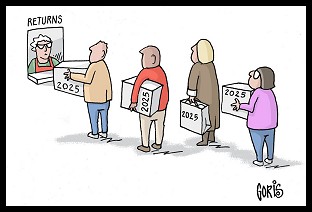 Sunday 'Many Happy Returns' Toons
Sunday 'Many Happy Returns' Toons Have a Holly Jolly Somehow
Have a Holly Jolly Somehow 'Tis the Sunday Before Christmas Toons
'Tis the Sunday Before Christmas Toons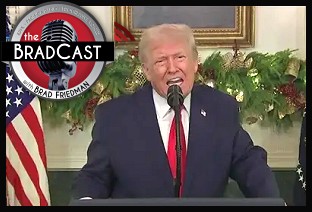 Old Man Shouts at People from White House for 20 Minutes, and Other Year-End Matters: 'BradCast' 12/18/25
Old Man Shouts at People from White House for 20 Minutes, and Other Year-End Matters: 'BradCast' 12/18/25 'Green News Report' 12/18/25
'Green News Report' 12/18/25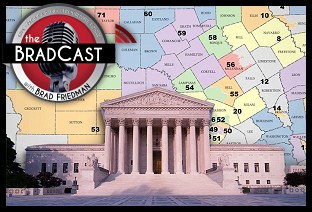 SCOTUS Ruling a How-To for Unlawful Gerrymandering on 'Eve' of Critical Election Year: BradCast' 12/17/25
SCOTUS Ruling a How-To for Unlawful Gerrymandering on 'Eve' of Critical Election Year: BradCast' 12/17/25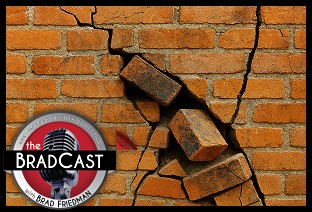 Bricks in the Wall: 'BradCast' 12/16/25
Bricks in the Wall: 'BradCast' 12/16/25 'Green News Report' 12/16/25
'Green News Report' 12/16/25 'This One Goes to 11': Weekend of Violence, Murder of Rob Reiner: 'BradCast' 12/15
'This One Goes to 11': Weekend of Violence, Murder of Rob Reiner: 'BradCast' 12/15 Sunday 'WTF?' Toons
Sunday 'WTF?' Toons Trump Now Losing One Battle After Another: 'BradCast' 12/11/25
Trump Now Losing One Battle After Another: 'BradCast' 12/11/25 'Green News Report' 12/11/25
'Green News Report' 12/11/25 Dems Continue Stunning 2025 Election Streak: 'BradCast' 12/10/25
Dems Continue Stunning 2025 Election Streak: 'BradCast' 12/10/25 Petrostates and Propa-gandists Undermining Climate Science: 'BradCast' 12/9/25
Petrostates and Propa-gandists Undermining Climate Science: 'BradCast' 12/9/25 The High Cost of Trump's Terrible Policy Making: 'BradCast' 12/8/25
The High Cost of Trump's Terrible Policy Making: 'BradCast' 12/8/25 Dems Fight to Avoid GOP's Year-End Health Care Cliff: 'BradCast' 12/4/25
Dems Fight to Avoid GOP's Year-End Health Care Cliff: 'BradCast' 12/4/25 A 'Flashing Red Warning Sign' for GOP: 'BradCast' 12/3/25
A 'Flashing Red Warning Sign' for GOP: 'BradCast' 12/3/25 Hegseth, War Crimes and DoD's 'Politicization Death Spiral': 'BradCast' 12/2/25
Hegseth, War Crimes and DoD's 'Politicization Death Spiral': 'BradCast' 12/2/25 Follow the
Follow the 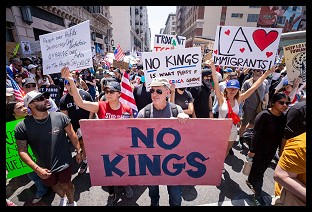 With Thanks, No Kings and Good Cheer
With Thanks, No Kings and Good Cheer
 VA GOP VOTER REG FRAUDSTER OFF HOOK
VA GOP VOTER REG FRAUDSTER OFF HOOK Criminal GOP Voter Registration Fraud Probe Expanding in VA
Criminal GOP Voter Registration Fraud Probe Expanding in VA DOJ PROBE SOUGHT AFTER VA ARREST
DOJ PROBE SOUGHT AFTER VA ARREST Arrest in VA: GOP Voter Reg Scandal Widens
Arrest in VA: GOP Voter Reg Scandal Widens ALL TOGETHER: ROVE, SPROUL, KOCHS, RNC
ALL TOGETHER: ROVE, SPROUL, KOCHS, RNC LATimes: RNC's 'Fired' Sproul Working for Repubs in 'as Many as 30 States'
LATimes: RNC's 'Fired' Sproul Working for Repubs in 'as Many as 30 States' 'Fired' Sproul Group 'Cloned', Still Working for Republicans in At Least 10 States
'Fired' Sproul Group 'Cloned', Still Working for Republicans in At Least 10 States FINALLY: FOX ON GOP REG FRAUD SCANDAL
FINALLY: FOX ON GOP REG FRAUD SCANDAL COLORADO FOLLOWS FLORIDA WITH GOP CRIMINAL INVESTIGATION
COLORADO FOLLOWS FLORIDA WITH GOP CRIMINAL INVESTIGATION CRIMINAL PROBE LAUNCHED INTO GOP VOTER REGISTRATION FRAUD SCANDAL IN FL
CRIMINAL PROBE LAUNCHED INTO GOP VOTER REGISTRATION FRAUD SCANDAL IN FL Brad Breaks PA Photo ID & GOP Registration Fraud Scandal News on Hartmann TV
Brad Breaks PA Photo ID & GOP Registration Fraud Scandal News on Hartmann TV  CAUGHT ON TAPE: COORDINATED NATIONWIDE GOP VOTER REG SCAM
CAUGHT ON TAPE: COORDINATED NATIONWIDE GOP VOTER REG SCAM CRIMINAL ELECTION FRAUD COMPLAINT FILED AGAINST GOP 'FRAUD' FIRM
CRIMINAL ELECTION FRAUD COMPLAINT FILED AGAINST GOP 'FRAUD' FIRM RICK SCOTT GETS ROLLED IN GOP REGISTRATION FRAUD SCANDAL
RICK SCOTT GETS ROLLED IN GOP REGISTRATION FRAUD SCANDAL VIDEO: Brad Breaks GOP Reg Fraud Scandal on Hartmann TV
VIDEO: Brad Breaks GOP Reg Fraud Scandal on Hartmann TV RNC FIRES NATIONAL VOTER REGISTRATION FIRM FOR FRAUD
RNC FIRES NATIONAL VOTER REGISTRATION FIRM FOR FRAUD EXCLUSIVE: Intvw w/ FL Official Who First Discovered GOP Reg Fraud
EXCLUSIVE: Intvw w/ FL Official Who First Discovered GOP Reg Fraud GOP REGISTRATION FRAUD FOUND IN FL
GOP REGISTRATION FRAUD FOUND IN FL

































